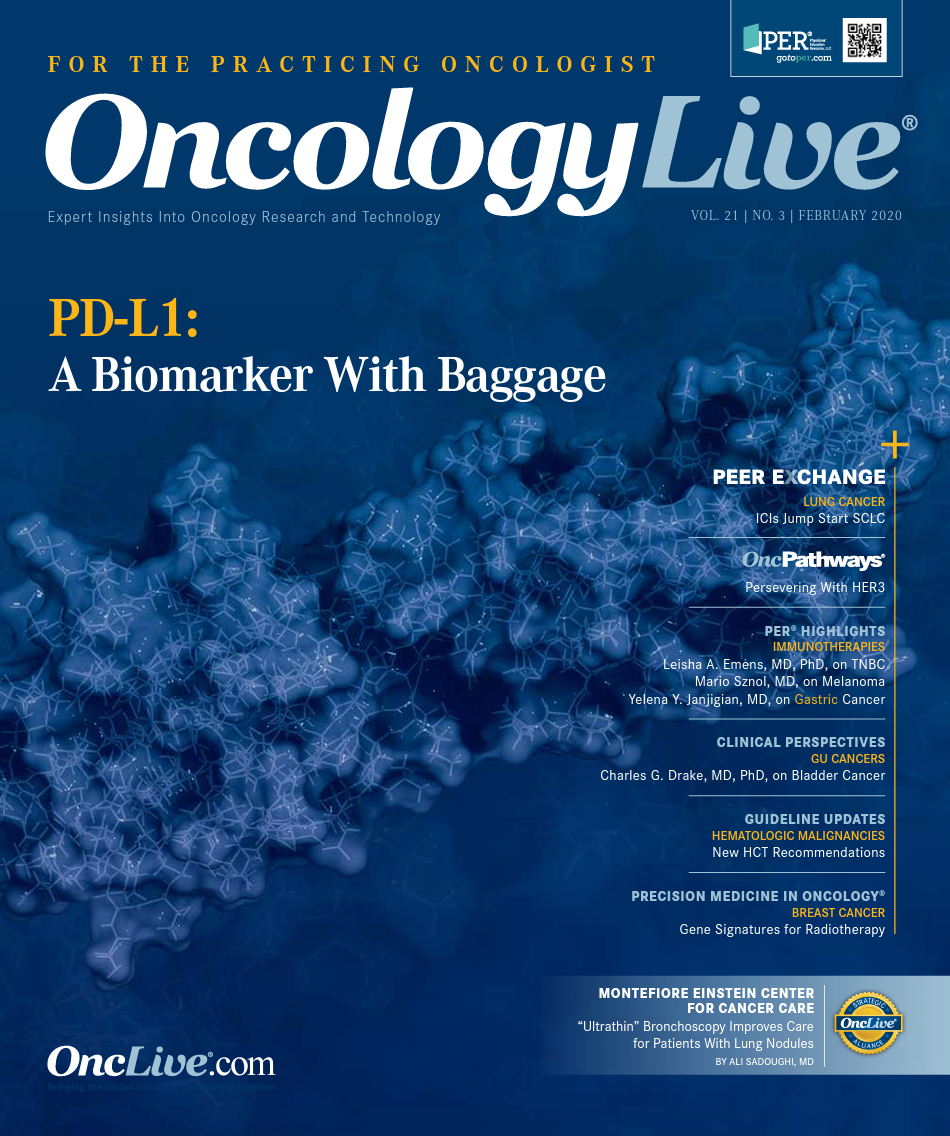Expert Advocates Moving Up Immunotherapy in MSI-H Gastric Cancer
Modest activity has been observed with anti–PD-1 therapies for patients with gastric, esophageal, and hepatocellular carcinoma in later lines of therapy, but for patients with microsatellite instability–high tumors and other subgroups, treatment with these agents has shown benefit over chemotherapy in the first-line setting, according to recent data.
Yelena Y. Janjigian, MD

Yelena Y. Janjigian, MD
Modest activity has been observed with anti—PD-1 therapies for patients with gastric, esophageal, and hepatocellular carcinoma (HCC) in later lines of therapy, but for patients with microsatellite instability–high (MSI-H) tumors and other subgroups, treatment with these agents has shown benefit over chemotherapy in the first-line setting, according to recent data.
“When you are thinking about heterogeneity of disease in gastric cancer and immunotherapy, the data increasingly show that for MSI-H cancers in Epstein-Barr virus [EBV]-related adenocarcinomas, immunotherapy should be considered in an earlier setting,” said Yelena Y. Janjigian, MD, in a presentation at the 4th Annual International Congress on Immunotherapies in Cancer®.1
“What’s provocative about these tumors is that MSI cancers tend to be chemotherapy refractory,” she said. “Patients with stage IV gastric cancer who receive first-line therapy and have progression may not be able to receive immunotherapy in second- and third-line settings.” Therefore, anti—PD-1 therapy in earlier lines of therapy should be considered for subsets of patients with gastric or esophageal cancer who may be more responsive to immune checkpoint inhibitors, she said. These subgroups include those with a PD-L1 combined positive score (CPS) ≥10 (30% of patients), MSI-H tumors (5%-20%), and EBV-related (5%) esophagus and gastric cancers.
MSI-H Tumors Reap the Most Benefit
In an analysis of the KEYNOTE-062 study, first-line pembrolizumab (Keytruda) was found to have an encouraging benefit for patients with MSI-H tumors. The phase III study randomized patients with HER2-negative, advanced gastric or gastroesophageal junction (GEJ) cancer 1:1:1 to receive either pembrolizumab or pembrolizumab plus chemotherapy compared with standard chemotherapy.2
For patients with a PD-L1 CPS ≥1, pembrolizumab monotherapy was noninferior to chemotherapy, with a median overall survival (OS) of 10.6 months (95% CI, 7.7-13.8) compared with 11.1 months (95% CI, 9.2-12.8) with chemotherapy (HR, 0.91; 99.2% CI, 0.69- 1.18; noninferiority margin = 1.2).
In the 50 patients who presented with MSI-H tumors, the OS findings were dramatically different for pembrolizumab monotherapy and the pembrolizumab combination versus chemotherapy. The chemotherapy arm had a median OS of 8.5 months versus not reached (NR) in the pembrolizumab arm (HR, 0.29; 95% CI, 0.11-0.81) and NR in the pembrolizumab plus chemotherapy versus chemotherapy arms (HR 0.37; 95% CI, 0.14-0.97).
Patients with MSI-H tumors also saw a benefit in progression-free survival (PFS), with median PFS of 11.2 months for patients treated with pembrolizumab monotherapy versus 6.6 months for those who received chemotherapy (HR, 0.72; 95% CI, 0.31-1.68). The median PFS was NR for patients treated with the pembrolizumab combination.
Additionally, patients with MSI-H tumors experienced fewer grade 3 to 5 treatment-related adverse events with pembrolizumab monotherapy versus pembrolizumab plus chemotherapy and chemotherapy alone—17%, 73%, and 69%, respectively.
Pembrolizumab is approved in the second line for the treatment of adult and pediatric patients with unresectable or metastatic MSH-H or mismatch repair deficient (dMMR) solid tumors that have progressed following prior treatment or colorectal cancer that has progressed following the triplet of fluoropyrimidines, oxaliplatin, and irinotecan.
“We really need to get [patients who have MSI-H tumors] to immunotherapy quickly because these patients deteriorate on chemotherapy and will not make it to later lines of therapy,” said Janjigian, who serves as chief of the Gastrointestinal Oncology Service at Memorial Sloan Kettering Cancer Center in New York, New York. She stated that about 15% of colorectal cancers present with MSI, and in about a third of those patients, the MSI is caused by Lynch syndrome.3
“In gastric and colon cancers, MSI-H is most common in the stage IV setting—about 4% of the metastatic population. Up to 10% of MSI-H cancers are Lynch. If you see an MSI-H cancer in your clinic, please test for Lynch, because it will be very important,” she stressed.
Utility of Immunotherapy Holds Strong in Later Lines
Anti—PD-1 therapies continue to show greater utility in second, third, and later lines of treatment for patients with gastric cancers. When selecting therapies for patients with gastric and esophageal cancers, CPS remains the most useful biomarker available because it incorporates both tumor and tumor-associated immune cell PD-L1 expression, Janjigian said.
Notable progress was seen in data reported from the phase III ATTRACTION-2 trial. The study randomized patients with advanced gastric/GEJ cancer unselected by PD-L1 to receive nivolumab (Opdivo) or placebo as ≥third-line therapy. The median OS after 2 years of follow-up was 5.26 months in the nivolumab arm versus 4.14 months with placebo (HR, 0.62; 95% CI, 0.51-0.76; P <.0001). The OS rate was 10.6% with nivolumab versus 3.2% with placebo. “This is a change in the field. Patients with gastric cancer have never seen survivals like this,” Janjigian noted.
However, the sooner immunotherapy is applied in the treatment path, the more the data reflect benefit in subgroups rather than the overall population. For example, in KEYNOTE-061, no survival benefit was observed for pembrolizumab compared with paclitaxel in the second-line treatment of gastric cancer in patients with CPS ≥1% (OS, 9.1 vs 8.3 months, respectively). However, a benefit was observed in patients with CPS ≥10% treated with pembrolizumab versus paclitaxel (OS, 10.4 vs 8.0 months; HR, 0.64; 95% CI, 0.41-1.02). The 12-month OS rate was 45% versus 25%, respectively.
“[The CPS ≥10 population] appears to be a unique subpopulation and is a small cohort of patients, only 19%. The data suggest that for select patients, pembrolizumab could be the right choice. Forty-five percent of patients alive at a year is quite impressive, considering [there was a] higher percent of Western patients on this study and these patients tend to do poorly,” Janjigian said. “Unfortunately, [for immune checkpoint blockade] in the first line, the data are not good because chemotherapy actually works in gastric cancer, and it’s hard to get these patients under control with anti— PD-1 therapy alone, even if you selected based on CPS >1.”
The future for immunotherapy in esophageal and gastric cancer, according to Janjigian, is combination therapy. One study exploring combination therapy is the phase I/II CheckMate-032 trial. Patients with advanced esophageal, GEJ, or gastric tumors were treated with nivolumab or 1 of 2 dose combinations of nivolumab and ipilimumab (Yervoy). Of 160 treated patients, 59 received nivolumab 3 mg/kg; 49, nivolumab 1 mg/kg plus ipilimumab 3 mg/kg (NIVO1/ IPI3); and 52, nivolumab 3 mg/kg plus ipilimumab 1 mg/kg (NIVO3/IPI1).4
The overall response rate was highest in the NIVO1/IPI3 arm at 24% versus 12% in nivolumab alone and 8% in the NIVO3/IPI1 arm. At median follow-up of 28, 24, and 22 months across the 3 groups, 12-month PFS rates were 17%, 8%, and 10%, respectively.
Janjigian noted that interesting efficacy and survival results for PD-1 therapy are expected to emerge from CheckMate 649 (NCT02872116). The large, multicenter, phase III study is examining nivolumab plus ipilimumab versus nivolumab plus chemotherapy versus chemotherapy alone in patients with previously untreated advanced gastric or GEJ cancer. The trial is primarily evaluating patient survival. It began recruiting in 2016, and the estimated completion date is October 2022.5
References
- Janjigian YY. Gastric cancer, hepatocellular carcinoma, and MSI-H malignancies. Presented at: 4th Annual International Congress on Immunotherapies in Cancer®; December 14, 2019; New York, NY.
- Shitara K. First-line pembrolizumab versus chemotherapy in patients with advanced G/GEJ cancer demonstrates similar survival and HRQoL. European Society for Medical Oncology website. bit.ly/2RhdcRE. Published September 29, 2019. Accessed January 13, 2020.
- Stadler ZK. Diagnosis and management of DNA mismatch repair-deficient colorectal cancer. Hem Oncol Clin N Am. 2015;29(1):29-41. doi: 10.1016/j.hoc.2014.09.008.
- Janjigan YY, Bendell J, Calvo E, et al. CheckMate-032 Study: efficacy and safety of nivolumab and nivolumab plus ipilimumab in patients with metastatic esophagogastric cancer. J Clin Oncol. 2018;36(28):2836-2844. doi: 10.1200/JCO.2017.76.6212.
- Efficacy Study of Nivolumab Plus Ipilimumab or Nivolumab Plus Chemotherapy Against Chemotherapy in Stomach Cancer or Stomach/Esophagus Junction Cancer (CheckMate649). clinicaltrials.gov/ct2/show/NCT02872116. Updated January 13, 2020. Accessed January 14, 2020.




